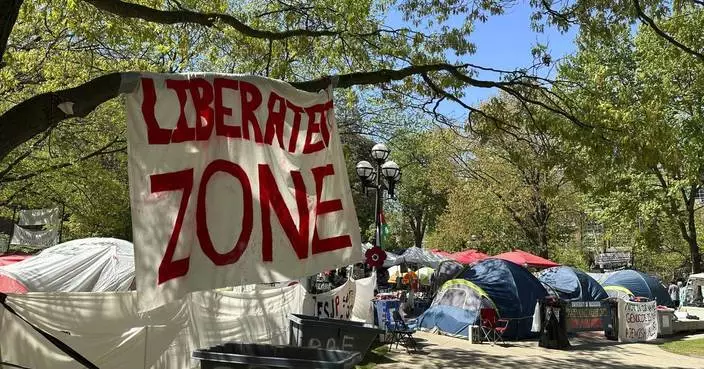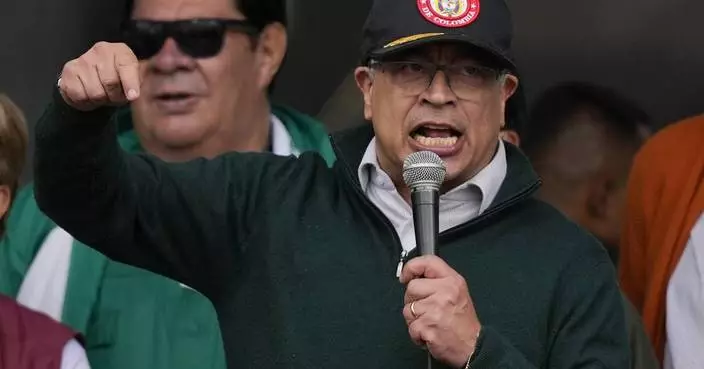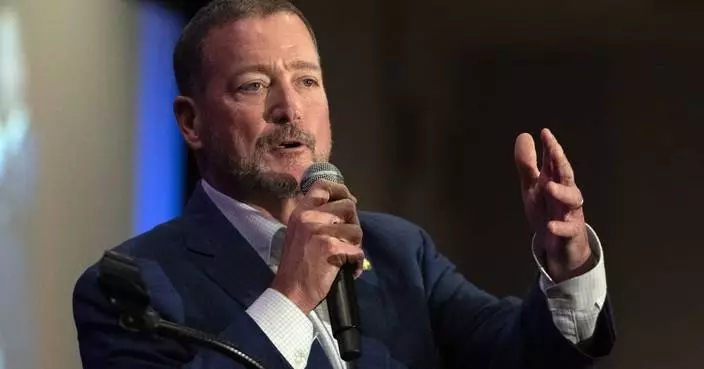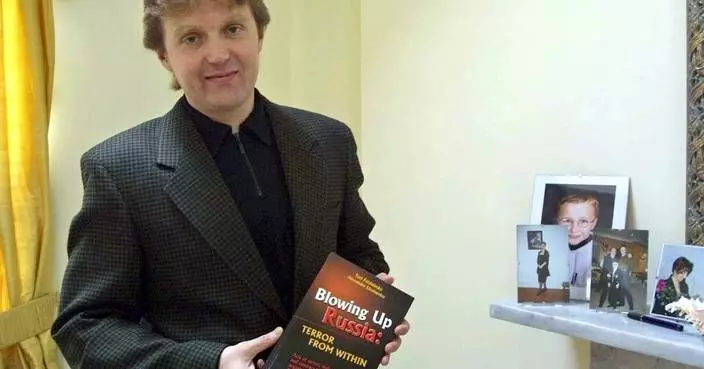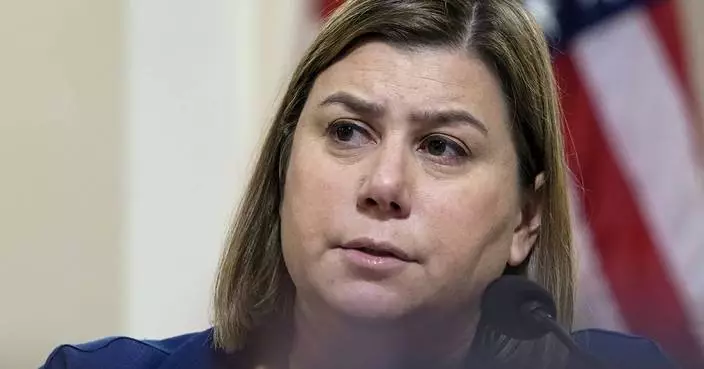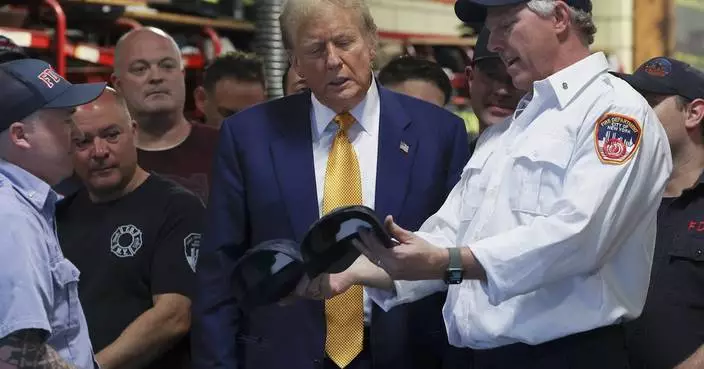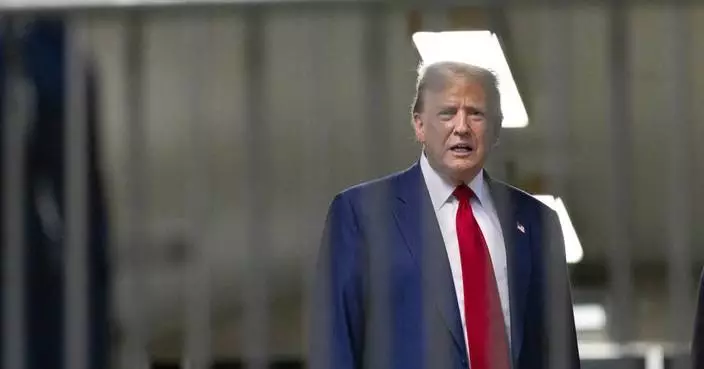North Korea said Friday that it's still willing to sit for talks with the United States "at any time, (in) any format," a remarkably restrained and diplomatic response, from a nation noted for its proud belligerence, to U.S. President Donald Trump's abrupt cancellation of a summit with the North's autocratic leader, Kim Jong Un.
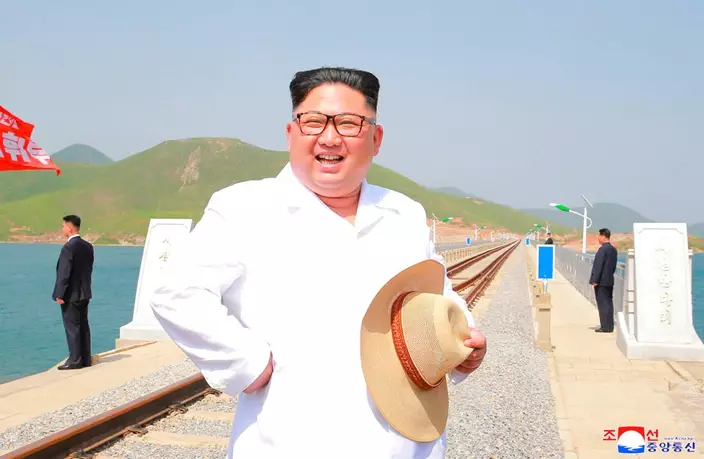
In this undated photo provided on Friday, May 25, 2018, by the North Korean government, North Korean leader Kim Jong Un inspects the completed Koam-Tapchon Railways in Gangwon-do, North Korea. Independent journalists were not given access to cover the event depicted in this image distributed by the North Korean government. The content of this image is as provided and cannot be independently verified. Korean language watermark on image as provided by source reads: "KCNA" which is the abbreviation for Korean Central News Agency. (Korean Central News Agency/Korea News Service via AP)
The statement by Vice Foreign Minister Kim Kye Gwan, a longtime nuclear negotiator and senior diplomat, which said the North is "willing to give the U.S. time and opportunities" to reconsider talks that had been set for June 12 in Singapore, could be driven by a need to use the summit to ease crushing international sanctions, or by a determination that a summit with the mercurial Trump is the best opportunity the North will ever have to elevate itself, and its nuclear program, to equality with its archrival. One analyst marveled that the North Korean response was "close to an apology letter."
Click to Gallery
North Korea said Friday that it's still willing to sit for talks with the United States "at any time, (in) any format," a remarkably restrained and diplomatic response, from a nation noted for its proud belligerence, to U.S. President Donald Trump's abrupt cancellation of a summit with the North's autocratic leader, Kim Jong Un.
The statement by Vice Foreign Minister Kim Kye Gwan, a longtime nuclear negotiator and senior diplomat, which said the North is "willing to give the U.S. time and opportunities" to reconsider talks that had been set for June 12 in Singapore, could be driven by a need to use the summit to ease crushing international sanctions, or by a determination that a summit with the mercurial Trump is the best opportunity the North will ever have to elevate itself, and its nuclear program, to equality with its archrival. One analyst marveled that the North Korean response was "close to an apology letter."
Earlier comments by South Korean President Moon Jae-in, seen as a driving force behind the summit and just returned to Seoul from a meeting with Trump in Washington, suggested that the South, a top U.S. ally and host to 28,500 U.S. troops, was blindsided by Trump's statement. Moon said he was "perplexed" at Trump's announcement that he was canceling the summit because of what the U.S. president said was North Korea's "tremendous anger and open hostility." Moon urged direct talks between Trump and Kim to get things back on track.
Kim Dong-yub, a North Korea expert at Seoul's Institute for Far Eastern Studies, said the North Korean response was notably "courteous, reserved and diplomatically refined," which he said shows that Pyongyang is eager to talk with Washington and believes that the United States needs more time to prepare for the summit.
In his statement to the North, Trump said: "If you change your mind having to do with this most important summit, please do not hesitate to call me or write."
Protesters with a portrait of U.S. President Donald Trump stage a rally against the United States' policies near the U.S. embassy in Seoul, South Korea, Friday, May 25, 2018. North Korea said Friday that it's still willing to sit down for talks with the United States "at any time, at any format" just hours after President Donald Trump abruptly canceled his planned summit with the North's leader Kim Jong Un. (AP Photo/Ahn Young-joon)
Regardless of the motivation, Kim Kye Gwan's statement is the latest whiplash development in efforts to diplomatically address what might be the world's most dangerous standoff. Focus will now swing back to how Trump will respond to the North's seemingly conciliatory gesture.
The stakes are high. A scrapping of diplomacy could see a return to the torrent of weapons tests — and the fears of war they created — that North Korea unleashed last year as it sought to put the finishing touches on a nuclear-armed missile program meant to target the entire U.S. mainland. Since January, Kim has taken a radically softer approach to foreign affairs, sending his sister to the Olympics in South Korea, meeting with his South Korean counterpart on their shared border and exploding parts of his nuclear testing site Thursday in an apparent sign of good faith. The Singapore summit would have been the culmination of this outreach.
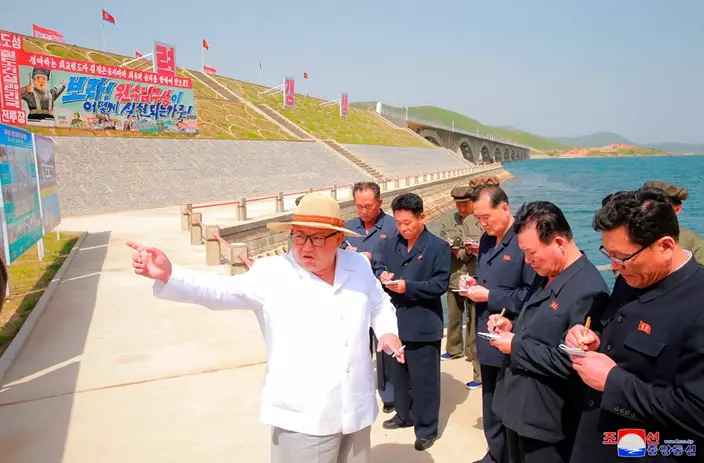
In this undated photo provided on Friday, May 25, 2018, by the North Korean government, North Korean leader Kim Jong Un inspects the completed Koam-Tapchon Railways in Gangwon-do, North Korea. Independent journalists were not given access to cover the event depicted in this image distributed by the North Korean government. The content of this image is as provided and cannot be independently verified. Korean language watermark on image as provided by source reads: "KCNA" which is the abbreviation for Korean Central News Agency. (Korean Central News Agency/Korea News Service via AP)
Earlier comments by South Korean President Moon Jae-in, seen as a driving force behind the summit and just returned to Seoul from a meeting with Trump in Washington, suggested that the South, a top U.S. ally and host to 28,500 U.S. troops, was blindsided by Trump's statement. Moon said he was "perplexed" at Trump's announcement that he was canceling the summit because of what the U.S. president said was North Korea's "tremendous anger and open hostility." Moon urged direct talks between Trump and Kim to get things back on track.
Many observers had expected a belligerent North Korean response to Trump's cancellation, but the comments by Kim, the North's vice foreign minister, seemed, at times, almost meek, and in stark contrast to the bellicose declarations last year of the North's willingness to pursue nuclear war.
Kim said Pyongyang's "objective and resolve to do our best for the sake of peace and stability of the Korean Peninsula and all humankind remain unchanged." Kim said the cancellation of the talks shows "how grave the status of historically deep-rooted hostile North Korea-U.S. relations is and how urgently a summit should be realized to improve ties."
"As far as the historic (North Korea)-U.S. summit is concerned, we have inwardly highly appreciated President Trump for having made the bold decision, which any other U.S. presidents dared not, and made efforts for such a crucial event as the summit," Kim said. "His sudden and unilateral announcement to cancel the summit is something unexpected to us and we cannot but feel great regret for it."
Kim speculated that Trump may have "lacked the will for the summit or he might not have felt confident," but that the North has "exerted sincere efforts" for talks that "would mark a meaningful starting point for peace and security in the region and the world."
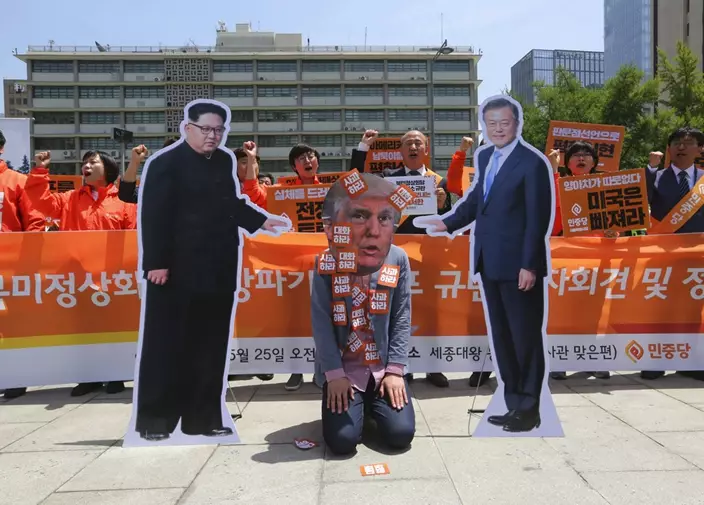
A protester wearing a mask of U.S. President Donald Trump, center, performs with cut-out photos of North Korean leader Kim Jong Un and South Korean President Moon Jae-in, right, during a rally against the United States' policies against North Korea near the U.S. embassy in Seoul, South Korea, Friday May, 25, 2018. North Korea said Friday that it's still willing to sit down for talks with the United States "at any time, at any format" just hours after President Donald Trump abruptly canceled his planned summit with the North's leader Kim Jong Un. The signs read " Apology." (AP Photo/Ahn Young-joon)
Kim Dong-yub, a North Korea expert at Seoul's Institute for Far Eastern Studies, said the North Korean response was notably "courteous, reserved and diplomatically refined," which he said shows that Pyongyang is eager to talk with Washington and believes that the United States needs more time to prepare for the summit.
Trump's cancellation of the summit came amid mounting skepticism about the North's sincerity after the country's earlier threats to scrap the Kim-Trump summit. That may have been aimed at bolstering its negotiating position, rather than killing the meeting.
"They wanted to face the United States in a more confident position. Obama or (Bill) Clinton could have accepted (these kinds of North Korean statements). But it's Trump. He's decided not to enter talks while being pushed (by North Korea) like this," said Choi Kang, vice president of Seoul's Asan Institute for Policy Studies.
Koh Yu-hwan, a professor at Seoul's Dongguk University, said Kim's statement was "close to an apology letter."
The North might have also sensed an opening in Trump's seemingly mixed messages.
"I really believe Kim Jong Un wants to do what's right," the U.S. president said at one point. Trump also said from the White House that a "maximum pressure campaign" of economic sanctions and diplomatic isolation would continue against North Korea — with which the U.S. is technically still at war — but he added that it was possible the summit could still take place at some point.
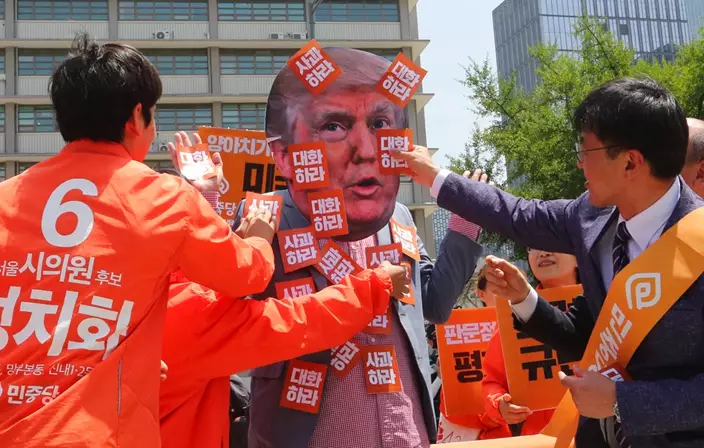
Protesters attach stickers at their fellow protester wearing a mask of U.S. President Donald Trump during a rally against the United States' policies against North Korea near the U.S. Embassy in Seoul, South Korea, Friday May 25, 2018. North Korea said Friday that it's still willing to sit down for talks with the United States "at any time, at any format" just hours after President Donald Trump abruptly canceled his planned summit with the North's leader Kim Jong Un. The signs read " Apology." (AP Photo/Ahn Young-joon)
In his statement to the North, Trump said: "If you change your mind having to do with this most important summit, please do not hesitate to call me or write."
It was unclear whether Trump was engaged in what he saw as a negotiating ploy or if his moves were a manifestation of mounting internal concerns over ensuring a successful outcome for the summit.
While the statement may keep the possibility of a summit alive, there were also hints in North Korea's response to Trump that Pyongyang was willing to walk away.
Kim said the United States is at fault for what Trump described as North Korea's "hostility," saying that Pyongyang was responding to "excessive" U.S. comments pressuring the country to "unilaterally discard" its nuclear weapons ahead of the summit. Trump's move to cancel the summit has forced the North to "rethink whether the efforts we have so far put in and the new path we have taken is the right choice."
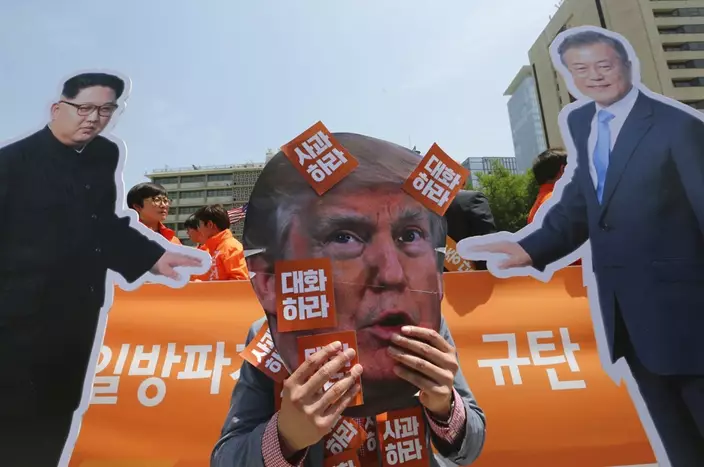
A protester wearing a mask of U.S. President Donald Trump, center, performs with cut-out photos of North Korean leader Kim Jong Un and South Korean President Moon Jae-in, right, during a rally against the United States' policies against North Korea near the U.S. embassy in Seoul, South Korea, Friday, May 25, 2018. North Korea said Friday that it's still willing to sit down for talks with the United States "at any time, at any format" just hours after President Donald Trump abruptly canceled his planned summit with the North's leader Kim Jong Un. The signs read " Apology." (AP Photo/Ahn Young-joon)
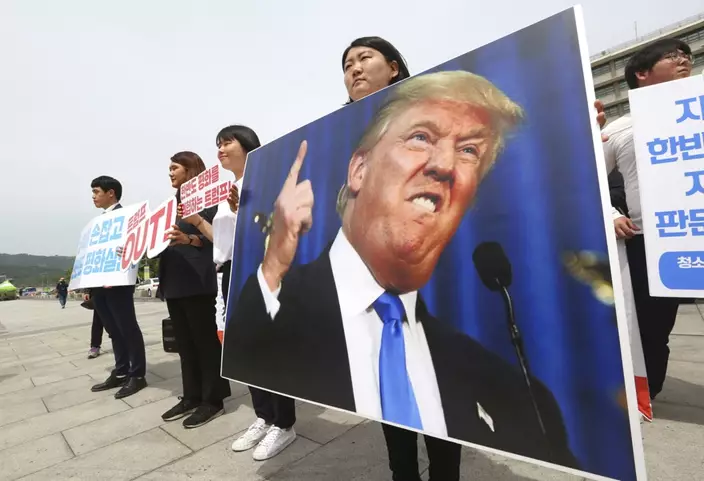
Protesters with a portrait of U.S. President Donald Trump stage a rally against the United States' policies near the U.S. embassy in Seoul, South Korea, Friday, May 25, 2018. North Korea said Friday that it's still willing to sit down for talks with the United States "at any time, at any format" just hours after President Donald Trump abruptly canceled his planned summit with the North's leader Kim Jong Un. (AP Photo/Ahn Young-joon)
NEW YORK (AP) — Hope Hicks, a former adviser to Donald Trump, took the stand Friday at the former president's hush money trial and recounted how his 2016 campaign became embroiled in a political firestorm over a recording in which he boasted about grabbing women without their permission.
Hicks, who served as White House communications director, is the first close Trump adviser to testify in the case, which accuses the Republican former president of a scheme to illegally influence the 2016 election by silencing women who claimed to have sexual encounters with him.
Prosecutors contend that the infamous “Access Hollywood” tape, which emerged just days before a debate, jolted Trump’s campaign and hastened his then-lawyer Michael Cohen’s hush money deal with porn actor Stormy Daniels to keep her quiet about claims she had a sexual encounter with Trump years earlier.
Hicks described being deeply concerned after learning about the tape's existence from a Washington Post reporter seeking comment about it. She huddled with other Trump advisers and read some of the transcript of the tape to Trump, she testified.
“I had a good sense to believe this was going to be a massive story and that it was going to dominate the news cycle for the next several days,” Hicks testified. “This was a damaging development."
Trump has denied the allegations of extramarital sexual encounters. The presumptive Republican presidential nominee for this year denies any wrongdoing in the case.
Hicks, who is is testifying for the prosecution under a subpoena, acknowledged she was “really nervous” after stepping up to the microphone. Referring to her former boss as “Mr. Trump,” she told the court she last communicated with him in the summer or fall of 2022.
While no longer in Trump's inner circle, Hicks spoke about the former president in glowing terms as the prosecutor began questioning her about her background. Hicks complimented Trump multiple times in the first few minutes of her testimony, describing him as a “very good multitasker, a very hard worker.”
Hicks served as Trump’s 2016 campaign press secretary and was one of a small number of early campaign staffers who joined his administration.
Former Trump attorney and fixer Michael Cohen, the prosecution's star witness, has yet to take the stand in the hush money trial. But jurors are already hearing Cohen's words as prosecutors work to directly tie Trump to payments to silence women with damaging claims about him before the 2016 election.
The second week of testimony in the case will wrap up Friday, a day after jurors heard a potentially crucial piece of evidence: a recording of Trump and Cohen discussing a plan to pay off an ex-Playboy model who claimed to have an affair with Trump. The former president denies the affair.
Prosecutors have spent the week using detailed testimony about meetings, email exchanges, business transactions and bank accounts to build on the foundation of their case accusing Trump of a scheme to illegally influence the election. They are setting the stage for pivotal testimony from Cohen, who paid Daniels $130,000 for her silence before he went to prison for the hush money scheme.
Trump's defense has worked to poke holes in the credibility of prosecution witnesses and to show that Trump was trying to protect his reputation and family — not his campaign — by keeping the women quiet. The defense also suggested while questioning an attorney who represented two women in hush money negotiations that Trump was, in fact, the victim of extortion.
The recording played Thursday was secretly made by Cohen shortly before the 2016 election. Cohen is heard telling Trump about a plan to purchase the rights to former Playboy model Karen McDougal’s story from the National Enquirer so that it would never come out. The tabloid had previously bought McDougal’s story to bury it on Trump’s behalf.
In the recording, Cohen revealed that he had spoken to then-Trump Organization Chief Financial Officer Allen Weisselberg about “how to set the whole thing up with funding.”
Trump can be heard responding: “What do we got to pay for this? One-fifty?”
Trump suggested the payment be made with cash, prompting Cohen to object by repeatedly saying “no." Trump then says “check” before the recording cuts off.
Prosecutors played the recording after calling to the stand Douglas Daus, a forensic analyst from the Manhattan district attorney’s office who performed analyses on iPhones Cohen turned over to authorities during the investigation. Daus returned to the stand Friday morning.
Jurors also heard more than six hours of crucial testimony this week from Keith Davidson, a lawyer who represented McDougal and Daniels in their negotiations with Cohen and the National Enquirer — the tabloid that bought and buried negative stories in an industry practice known as “catch and kill.” Davidson on Thursday described being shocked that his hidden-hand efforts might have contributed to Trump winning the 2016 election.
“What have we done?” Davidson texted the then-editor of the National Enquirer on election night when it became clear that Trump was going to win. “Oh my god,” the tabloid editor responded.
“There was an understanding that our efforts may have in some way — strike that — our activities may have in some way assisted the presidential campaign of Donald Trump,” Davidson told jurors.
Trump’s lawyers sought to blunt the potential harm of Davidson’s testimony by getting him to acknowledge that he never had any interactions with Trump — only Cohen. In fact, Davidson said, he had never been in the same room as Trump until his testimony.
“I had no personal interactions with Donald Trump. It either came from my clients, Mr. Cohen or some other source, but certainly not him,” Davidson said.
Trump is charged with 34 counts of falsifying internal Trump Organization business records. The charges stem from paperwork such as invoices and checks that were deemed legal expenses in Trump Organization records. Prosecutors say they were really reimbursements to Cohen for the $130,000 hush money payment to Daniels.

Former President Donald Trump arrives at Manhattan criminal court in New York, on Friday, May 3, 2024. (Charly Triballeau/Pool Photo via AP)

Former President Donald Trump appears at Manhattan criminal court before his trial in New York, Friday, May 3, 2024. (Curtis Means/Pool Photo via AP)

Former President Donald Trump appears at Manhattan criminal court before his trial in New York, Friday, May 3, 2024. (Mark Peterson/Pool Photo via AP)

Former President Donald Trump appears at Manhattan criminal court before his trial in New York, Friday, May 3, 2024. (Mark Peterson/Pool Photo via AP)

Former President Donald Trump appears at Manhattan criminal court before his trial in New York, Friday, May 3, 2024. (Mark Peterson/Pool Photo via AP)

Former President Donald Trump appears at Manhattan criminal court before his trial in New York, Friday, May 3, 2024. (Mark Peterson/Pool Photo via AP)

Former President Donald Trump arrives at Manhattan criminal court in New York, on Friday, May 3, 2024. (Mark Peterson/Pool Photo via AP)
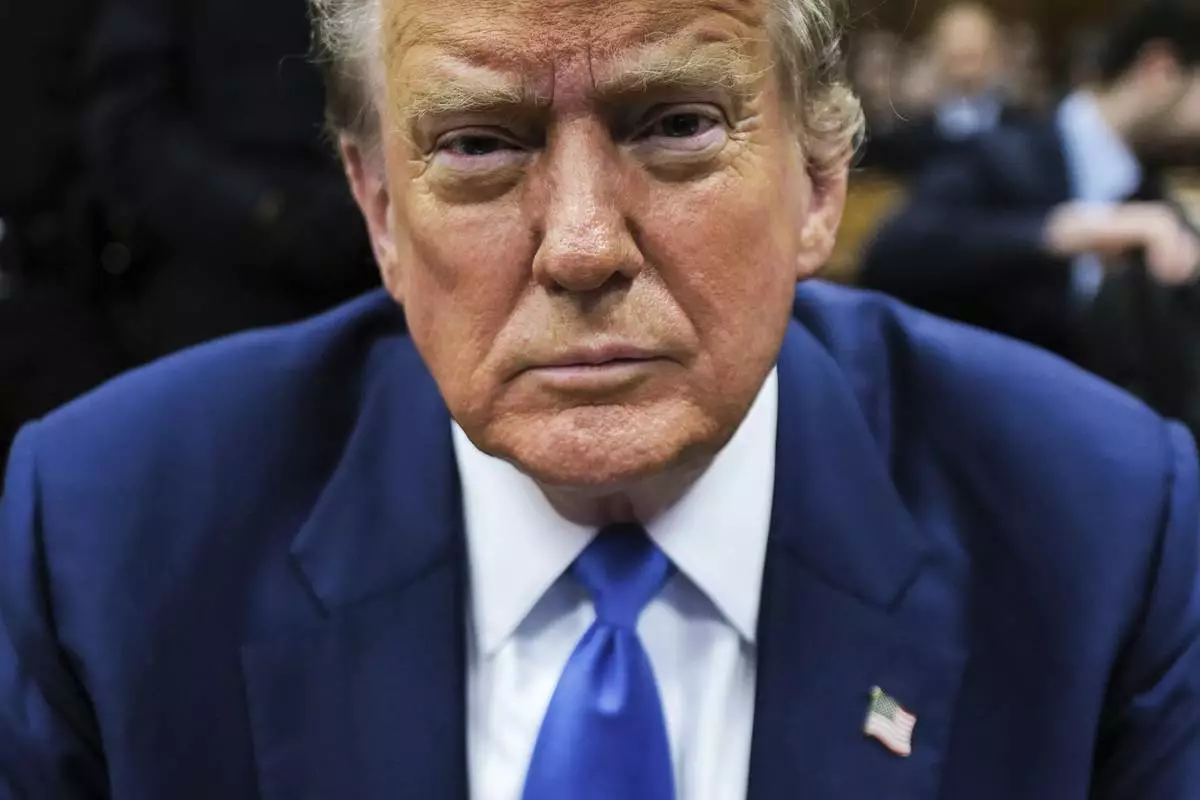
Former President Donald Trump appears at Manhattan criminal court before his trial in New York, Friday, May 3, 2024. (Charly Triballeau/Pool Photo via AP)

Former President Donald Trump appears at Manhattan criminal court before his trial in New York, Friday, May 3, 2024. (Charly Triballeau/Pool Photo via AP)

Former President Donald Trump arrives at Manhattan criminal court in New York, on Friday, May 3, 2024. (Charly Triballeau/Pool Photo via AP)

Former President Donald Trump appears at Manhattan criminal court before his trial in New York, Friday, May 3, 2024. (Jeenah Moon/Pool Photo via AP)

Former President Donald Trump appears at Manhattan criminal court before his trial in New York, Friday,, May 3, 2024.(Charly Triballeau/Pool Photo via AP)

FILE - Hope Hicks, former White House Communications Director, arrives to meet with the House Intelligence Committee, at the Capitol in Washington, Feb. 27, 2018. Prosecutors say Hicks spoke with former President Donald Trump by phone during a frenzied effort to keep allegations of his marital infidelity out of the press after the infamous "Access Hollywood" tape leaked weeks before the 2016 election. In the tape, from 2005, Trump boasted about grabbing women without permission. (AP Photo/J. Scott Applewhite, File)

Former President Donald Trump leaves court, Thursday, May 2 2024, in New York, following the day's proceedings in his hush money trial. (Mark Peterson/New York Magazine via AP, Pool)

Republican presidential candidate, former President Donald Trump awaits the start of proceedings for his trial at the Manhattan criminal court, Thursday, May 2, 2024, in New York. (Doug Mills/The New York Times via AP, Pool)
























